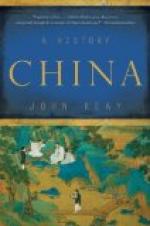In addition to these conflicts between state and popular Buddhism, clashes between Buddhists and representatives of organized Taoism occurred. Such fights, however, reflected more the power struggle between cliques than between religious groups. The most famous incident was the action against the Buddhists in 446 which brought destruction to many temples and monasteries and death to many monks. Here, a mighty Chinese gentry faction under the leadership of the Ts’ui family had united with the Taoist leader K’ou Ch’ien-chih against another faction under the leadership of the crown prince.
With the growing influence of the Chinese gentry, however, Confucianism gained ground again, until with the transfer of the capital to Loyang it gained a complete victory, taking the place of Buddhism and becoming once more as in the past the official religion of the state. This process shows us once more how closely the social order of the gentry was associated with Confucianism.
(E) Succession States of the Toba (A.D. 550-580): Northern Ch’i dynasty, Northern Chou dynasty
1 Reasons for the splitting of the Toba empire
Events now pursued their logical course. The contrast between the central power, now become entirely Chinese, and the remains of the tribes who were with their herds mainly in Shansi and the Ordos region and were hopelessly impoverished, grew more and more acute. From 530 onward the risings became more and more formidable. A few Toba who still remained with their old tribes placed themselves at the head of the rebels and conquered not only the whole of Shansi but also the capital, where there was a great massacre of Chinese and pro-Chinese Toba. The rebels were driven back; in this a man of the Kao family distinguished himself, and all the Chinese and pro-Chinese gathered round him. The Kao family, which may have been originally a Hsien-pi family, had its estates in eastern China and so was closely associated with the eastern Chinese gentry, who were the actual rulers of the Toba State. In 534 this group took the impotent emperor of their own creation to the city of Yeh in the east, where he reigned de jure for a further sixteen years. Then he was deposed, and Kao Yang made himself the first emperor of the Northern Ch’i dynasty (550-577).
The national Toba group, on the other hand, found another man of the imperial family and established him in the west. After a short time this puppet was removed from the throne and a man of the Yue-wen family made himself emperor, founding the “Northern Chou dynasty” (557-580). The Hsien-pi family of Yue-wen was a branch of the Hsien-pi, but was closely connected with the Huns and probably of Turkish origin. All the still existing remains of Toba tribes who had eluded sinification moved into this western empire.




